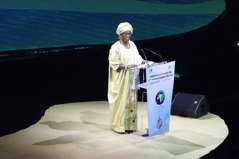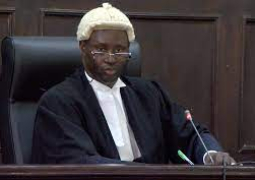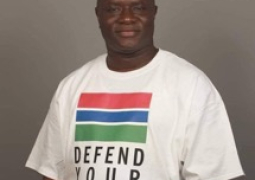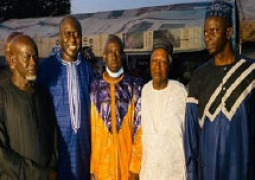
His Excellency Adama Barrow,
President of the Republic of The Gambia
- E President Macky Sall, President of the Republic of Senegal,
- E Hage Geingob, President of the Republic of Namibia,
- E Mark Rutte, Prime Minister of the Kingdom of the Netherlands,
- E Jakaya Kikwete, Former President of the United Republic of Tanzania,
- Invited guests and delegates
I would like to thank the World Water Council, Our Sister Republic of Senegal and other key stakeholders for organising this important event and moreso, for inviting and associating meto this particular event on, ‘an International High-Level Panel on Water Investments for Africa’. As the world recovers from the global coronavirus pandemic, many countries are still facing tight financial and economic challenges, thus, this panel is a welcome and a timely initiative by Africa and for Africans.
I therefore would like to start by congratulating the convenors of the International High-Level Panel on Water Investment for Africa; the United Nations Development Programme (UNDP,) United Nations Children’s Fund (UNICEF), African Union Development Agency (AUDA-NEPAD), African Ministers’ Council on Water (AMCOW), African Development Bank (AfDB), Global Center on Adaptation (GCA), and Global Water Partnership (GWP) forthis landmark and laudable initiative.
The Gambia is part of the Senegalo-Mauritanian Aquifer Basin (SMAB), stretching from Guinea Bissau right to Mauritanian (approx. 1,300 km long). The aquifer is shared with Senegal, Mauritania, Guinea Bissau and covers hundred percent of our country.
The aquifer basin supports a population of over 25 million inhabitants in the riparian states, as of 2020. The SMAB member states depend for more than 80% on groundwater resources to meet the domestic needs of their populations. The availability of adequate good quality groundwater is already a constrain in all the SMAB countries, coupled with excessive withdrawals leading to saline intrusion especially in the coastal areas.Moreover, average annual rainfall has declined by about 30%since the 1950’s and distribution pattern is almost unpredictable with increasing dry spells leading to recurrent droughts.
The country is also part of the river Gambia basin organisation (OMVG) which covers more than ninety percent of the country. The flow of the river has also declined in the decades with increase salinization in the downstream reaches of The Gambia, affecting ecosystem, biodiversity and agricultural productivity.
In view of the above, there is an urgent need to increase funding on the strategies to increase water resources availability especially groundwater in the ever-growing urban areas with the obligation to meet the growing demand from the soaring populations, sustain the environment and support the economic activities.
Excellencies, Ladies and gentlemen, in view of the above, The Gambia has instituted several institutional, legal and policy strategies in order to enhance the effective delivery of the water, sanitation and hygiene services.Notably, the development of theNational Water Resources Management Strategic Plan 2015 – 2019, which is still not implemented due to inadequate funding.
Furthermore, coupled with recently completed and newly launched rural water supply and sanitation projects, the Government has developed new projects such as; Water Supply Project in the Greater Banjul Area (WASIB) funded by French Development Agency (AFD), the OIC Water Supply project, which are to increase access to safe drinking water to the expanding urban and peri-urban areas in The Gambia.
Excellencies, Ladies and gentlemen, although The Gambia has made progress in terms of the national access to basic drinking water more investment is required in the access to safely managed drinking water services which is less than 35% in the urban areas and not more than 2% in the rural areas. By far, access to basic sanitation service is less, contributing to high prevalence of preventable WASH-related diarrheal diseases.
With the estimated required water investmentof 45- 54 billion US Dollar. So far only 10 - 19 billion US Dollarhas being disbursed. The AIP aims to narrow the water investment gap by mobilizing USD 30 billion annually until 2030.
The Republic of Gambia looks forward to work with other distinguished leaders and development partners on actionable pathways for the implementation of the AIP.
We call on international leaders assembled here to support the AIP and the International High-Level Panel on Water Investments for Africa.
I wish you successful deliberations and enjoyable stay in the beautiful city of Dakar Senegal.
I thank you very much!
Read Other Articles In Headlines

More than 20 officers arrested alleged drug dealers - says defence counsel
Nov 29, 2024, 10:47 AM




